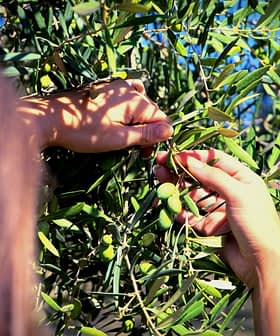 57.7K reads
57.7K readsBasics
The Facts About Olive Oil and Skin Care

Olive oil has been used for skincare for thousands of years, with its antibacterial and antioxidant properties making it a popular ingredient in soaps and lotions. While applying extra virgin olive oil topically can have benefits for the skin, it is important to use it in moderation to avoid clogging pores and causing acne. Additionally, extra virgin olive oil can be used as a makeup remover and moisturizer, but it is important to choose high-quality oils to ensure maximum benefits.
People have been using olive oil for face and skincare for millennia and Homer’s “liquid gold” continues to be a staple in soaps and other beauty products.
Olive oil-based unguents and cosmetics have been found in 5,000-year-old tombs in Egypt, where they were used to preserve mummies.
At the public baths in Ancient Greece, bathers would slather their skin in olive oil before using a thin metal blade to scrape away the mixture of oil, dirt and sweat. The Romans would later adopt the practice in their own baths.
See Also:Olive Oil BasicsOlive oil soap has been produced in the Levant for more than 1,000 years and by the fourteenth century played a critical role in the medieval soap production factories of Venice and Marseille.
However, not every olive oil is created equally and all skin is different. Therefore, when and how to use olive oil as a cleanser, lotion or moisturizer depends on a variety of factors.
Olive oil to cleanseskin
Extra virgin olive oil has been proven to have various anti-fungal and anti-bacterial properties, and is loaded with antioxidants. This combination makes high-quality EVOOs the perfect ingredient for soap.
Dozens of phenolic compounds have been identified in extra virgin olive oil and several of these have been proven to stave off skin infections.
See Also:Olive Oil for Skin and HairThere is also some evidence demonstrating that vitamin E – an antioxidant found in extra virgin olive oil – even kills the bacteria that causes acne, eczema and psoriasis.
However, applying extra virgin olive oil directly to your skin in large amounts may have a more comedogenic effect – clogging pores and even causing acne.
As a result, dermatologists recommend applying raw extra virgin olive oil to the skin with an eyedropper before gently massaging it in.
Olive oil rejuvenates and heals damaged skin
Away from their antibacterial properties, the vitamins and antioxidants found in extra virgin olive oil have a range of other benefits.
Vitamin E also helps to protect the skin against ultraviolet light. Some evidence even suggests that extra virgin olive oil can reverse some of the damage caused by ultraviolet radiation.
See Also:Health NewsAntioxidants also help to trap free radicals and prevent them from damaging the skin. Along with keeping the skin healthier, this helps to lessen the effects of aging as well.
Additionally, the anti-inflammatory properties of extra virgin olive oil have been shown to help heal damaged skin tissue. Although some doctors argue that extra virgin olive oil is most effective at achieving this when ingested as opposed to used topically.
There is even some evidence to suggest that ingesting extra virgin olive oil can help to heal burned skin tissue. However, dermatologists warn not to apply extra virgin olive oil to burns topically.
Olive oil as a moisturizer
Along with being packed full of anti-bacterial properties and plenty of skin-friendly vitamins, olive oil is also an emollient, which makes it an excellent moisturizer.
When the top layer of the skin does not contain enough water, the skin cells become flakey and can fall off or crack. This leaves gaps in between the skin cells, which may allow dirt and bacteria to build up.
Emollients fill in these gaps with lipids, sealing them off to bacteria and alleviating the irritation associated with dry and flakey skin.
See Also:Olive Oil and BeautyExtra virgin olive oil, like many other emollients, is also an occlusive, which means it traps water underneath a thin oily film.
Dermatologists recommend applying extra virgin olive oil – or creams that incorporate extra virgin olive oil – while the skin is still damp in order to trap the water inside the cells.
However, too much olive oil may clog the pores of the skin, which can lead to pimples, acne and skin irritation. It is best to use a bit (roughly the size of a dime) of extra virgin olive oil and wipe the excess away with a towel or cloth.
Olive oil for the face
While extra virgin olive oil serves as an effective moisturizer and perfect ingredient for soap or lotion, it can also be used on the face, just not as liberally as elsewhere on the body.
One of the most popular uses of extra virgin olive oil is as a makeup remover. Instead of using a harsh tonic to remove makeup, which can dry out or damage the skin, olive oil works well to break down the waxy substances that make eyeliner or mascara waterproof.
While the extra virgin olive oil cannot fully remove the makeup, it is a first good step to lift it off the skin. Additionally, the antioxidants, including squalene, can help to moisturize the sensitive skin around the eyes and relieve some of the oxidative stress that causes wrinkles.
However, the skin on the face is more delicate than elsewhere on the body and everybody’s skin is different. For people with more oily skin, raw extra virgin olive oil may not be the best option. Instead, it may be best to buy facial creams that incorporate extra virgin olive oil as an ingredient.
Buying extra virgin olive oil
Regardless of how olive oil is used in skincare, one thing remains constant – only extra virgin olive oil provides the aforementioned benefits. Refined olive oil has far fewer antioxidants and phenolic compounds.
The retail finder on the Official Guide to the World’s Best Olive Oils makes it easy to find award-winning extra virgin olive oils near you or through online retailers.









